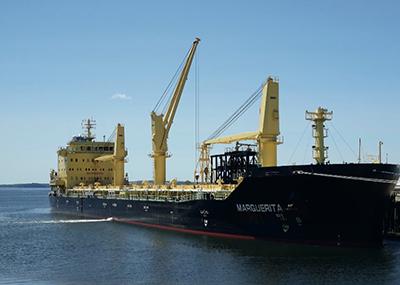A German shipping company that transports clay slurry for use in U.S. paper mills pleaded guilty and was sentenced Nov. 2 in Portland, Maine, for obstruction of justice and maintaining falsified logbooks to conceal use of a "magic pipe" to conceal discharges of oily bilge waste, the U.S. Justice Department said.
MST Mineralien Schiffahrt Spedition und Transport GmbH (MST), based in Bavaria, Germany, pleaded guilty to the charges involving one of its bulk carriers, the 607’x76’, 27,674 dwt Marguerita, said Assistant Attorney General Jeffrey B. Clark for the Justice Department’s Environment and Natural Resources Division and U.S. Attorney Halsey B. Frank for the District of Maine.
The company was already on probation for a similar offense in Great Lakes waters in 2016, according to the Justice Department.
MST pleaded guilty to one count of violating the Act to Prevent Pollution from Ships and one count of obstruction of justice for using falsified log books to hide intentional discharges of oily bilge waste occurring over a nine-month period, when the ship regularly made port calls in Portland.
U.S. District Court Judge Nancy Torresen sentenced the company pursuant to a plea agreement and ordered it to pay a $3.2 million criminal fine and serve a four-year term of probation during which vessels operated by the company will be required to implement an environmental compliance plan, including inspections by an independent auditor.
“Today’s action demonstrates that the Coast Guard and the Justice Department will not stand by while foreign vessels intentionally pollute our oceans and then try to cover up their criminal acts by lying to the U.S. Coast Guard,” said Assistant Attorney General Jeffrey Bossert Clark. “This company is a repeat offender, which makes plain that it has shown contempt for the rule of law. I applaud the investigators and prosecutors who obtained this result.”
MST was convicted of similar environmental crimes in the District of Minnesota in 2016. That federal case involved the falsification of the oil record book for another vessel, the Cornelia, which concealed deliberate discharges of oil-contaminated bilge waste, including discharges into the Great Lakes. MST was on probation in the District of Minnesota when it committed the crimes charged in Maine.
According to documents filed in court, MST discharged oily bilge waste from the Marguerita through the use of a so-called “magic pipe,” a euphemism for concealed equipment that allows crew members to bypass required pollution prevention equipment and dump waste illegally.
The discharges violated the MARPOL international pollution control treaty, and were not recorded in the vessel’s oil record book, a required ship log regularly inspected by the Coast Guard to assure compliance.
MST has been bringing clay slurry for Maine paper mills for 20 years, landing cargoes at Portland and Searsport. The company underlined that relationship with a public christening of the Marguerita at Portland in July 2016, which had been delivered by shipbuilders in China five months before.
The case was investigated by the Coast Guard Investigative Service with assistance from the Coast Guard Sector Northern New England, which conducted the inspection of the ship. The prosecution was handled by trial attorney John Cashman and senior litigation counsel Richard Udell of the Environmental Crimes Section of the U.S. Department of Justice, with assistance from the U.S. Attorney’s Office for the District of Maine.





